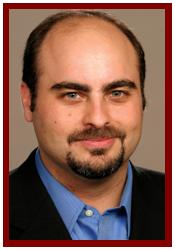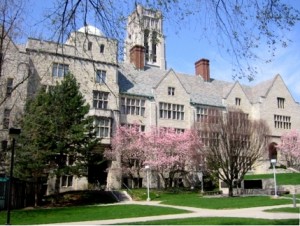“It must be great being a college professor. You get summers off!”
 All professors have probably heard this sentiment, in one form or another. It is usually accompanied by a sigh, the commenter wishing that she had such a cushy life. Though as many times as I have heard it, I know that it is not necessarily intended as a slight or a criticism. Most often, it is expressed as a good-natured if ignorant observation about the unusual perks of a somewhat exotic job, rather like when people tell flight attendants, “Wow, you get to fly all over the place for free!”
All professors have probably heard this sentiment, in one form or another. It is usually accompanied by a sigh, the commenter wishing that she had such a cushy life. Though as many times as I have heard it, I know that it is not necessarily intended as a slight or a criticism. Most often, it is expressed as a good-natured if ignorant observation about the unusual perks of a somewhat exotic job, rather like when people tell flight attendants, “Wow, you get to fly all over the place for free!”
What makes academic life seem so exotic is that being a professor is more like practicing a medieval craft than pursuing a modern profession. As befits a world of robes, elaborate ceremonies, and gothic quadrangles, universities maintain a system of unique rewards and demands that harkens back to pre-modern times.
Practically, this means that the work habits of academics are hard to reconcile with the patterns of most normal professions. Academics are supposed to do two things—produce knowledge and share that knowledge with the larger community. They are also, according to tradition, supposed to govern and police themselves. Although that does not mean what it used to, when universities had special laws and even their own jails (some of which are preserved as tourist sites in European university towns such as Heidelberg in Germany) it still means that universities pride themselves on being governed by their own—deans, directors, chairs, and presidents drawn from the faculty.[1]
In present parlance, that means university faculty members are evaluated according to the classic trilogy of research, teaching, and service to the academic community.[2]
Here we get at the root of the contrast between what people think professors do and what they actually do. For the things that are most visible to the outside world—teaching in the classroom, meeting with students in office hours, grading assignments—is also only a part of what academics are expected to do. When junior faculty sigh and say they “really need to find time to do my own work,” they are rarely referring to teaching. Indeed, even the most dedicated teacher who devotes time to developing and preparing new courses is going to need a lot of time alone to gather and develop new knowledge. That means everything from reading and reviewing the newest literature in their field to working on their own projects. None of these tasks lend themselves to punching a clock. Academics are paid to think and read and write, which means a lot of their time is unstructured, and they have freedom to organize it according to their own priorities. That is the positive view. The less positive view is to note that unstructured work means that it is never really over. There is always more to read, and those books and articles don’t write themselves.
 So academics have to deal with less immediate but more constant pressures than people in other professions, all the year round. That is not a complaint, since I am sure that a lot of people in other types of jobs wish the pressures they felt were less tangible, but it is something to think about before claiming that because professors only teach a few classes a semester, or do not teach in the summer, they have a lot of “free time.”
So academics have to deal with less immediate but more constant pressures than people in other professions, all the year round. That is not a complaint, since I am sure that a lot of people in other types of jobs wish the pressures they felt were less tangible, but it is something to think about before claiming that because professors only teach a few classes a semester, or do not teach in the summer, they have a lot of “free time.”
If those outside academe have a hard time understanding what goes on there, that is also because the practical details of academic life can vary greatly depending on both the type of university or college and the field in which an academic operates (and of course upon whether one is on the tenure track). Schools can range from teaching-heavy colleges (which would include both small private institutions and satellite campuses of state universities, as well as community colleges) where the average professor is expected to offer four or five courses a semester (and do all of her own grading) to the elite research universities where the load is usually two courses a semester—perhaps less, if the faculty member has special administrative responsibilities such as chairing a department or directing an institute—and where most of the grading is done by graduate students, as part of their apprenticeship before beginning their own academic careers.[3]
Teaching and research exist in tight, inverse proportions: the lower the teaching load, the higher the research expectations.[4] What those research expectations may be depends on the field. In the natural sciences, successful academics are expected to manage a laboratory and conduct a range of experiments. That means hiring and supervising a small army of student assistants, and applying for and managing the large outside grants necessary to fund the operations. Natural scientists also publish several research reports and articles a year. Most of those publications will be multi-authored, which (to put it most charitably) allows scientists to leverage their work into more publications than they could have produced on their own. Humanities and social science professors publish fewer and longer pieces—journal articles and books, usually single-authored—and are less dependent on labs and grants, except when they need to travel to archives.
Critics ranging from undergraduates unable to get an appointment to complain about midterm grades to Wall Street Journal op-ed writers have attacked the attention faculty pay to what can appear to be unnecessarily esoteric research.[5] Imust admit to having mixed emotions about these criticisms. There is nothing wrong with demanding that faculty remember their responsibility to share their knowledge with non-specialists, and I am a firm believer in the importance of teaching. What such critics tend to miss, however, is the responsibility of professors not only to repeat old knowledge but to create new knowledge as well. At their best, such criticisms can serve to puncture the pomposity of over-specialized academics. At their worst, they sink to the level of the know-nothings who want to eliminate the library budget because no one has read all the books that are already in it.
Another peculiarity of the academic world is that the vast majority of these publications are essentially unpaid volunteer work. Academic journals do not pay their authors, nor do they usually pay their editors, who receive small stipends or teaching releases in return for their service to the profession. Typically, the reviewers who provide the double-blind evaluations necessary for peer review are also volunteers.[6] Compensation comes indirectly, in the form of tenure, promotion, or merit bonuses from one’s own university (as long as one is on the tenure track…but you guessed that already). Rare is the professor who makes real money from books. Most are happy to sell a few hundred copies in hardback to research libraries.[7] A fortunate minority makes it to paperback. Those books are adopted for course use, and can enjoy lifetime royalties that may even extend into four figures. An even smaller, most fortunate few may actually reach the broader general audience that is referenced in every book proposal ever written.
In the end, however, publication is valuable for how it serves the career interests of the professors—allowing them to develop a reputation in their fields, gain and hold plum positions, and especially to achieve the security of tenure. Critics might say this reveals a tension between the pursuit of knowledge and the demands of careerism, but no one has been able to come up with a better system.
At the same time, the relative weight given to teaching, research, and service in an overall tenure evaluation, and even the definition of success in each area, is a private matter to be determined by individual universities and their faculty. In vain do people search for some kind of precise measurement—the kind of thing the modern world craves.[8] Anyone who has gone through the tenure process (as your author has, multiple times) knows that Franz Kafka was an optimist. Schools are reluctant to be too specific in advance, lest they rob themselves of the freedom to decide individual cases without fear of litigation. Even when individual departments try to give specific advice, that advice comes with the large asterisk that no one can predict how the upper levels of administration, where the final decision rests, will ultimately decide a case. In the end, the only thing to be sure of is that you should probably be doing more than you are.[9]
That is one of the major reasons why so many professors become less productive once they cross the tenure finish line. That sense of crossing over, and being expected to take on greater responsibility for the community, yet somehow having to create meaning and purpose on their own, without that big brass ring as a motivator, can be an incredible burden. The phenomenon is so widespread that a recent article in The Chronicle of Higher Education explores the question of why Associate Professors have become some of the unhappiest people on campus.
Maybe they could all use some time off after all.









Leave a Reply